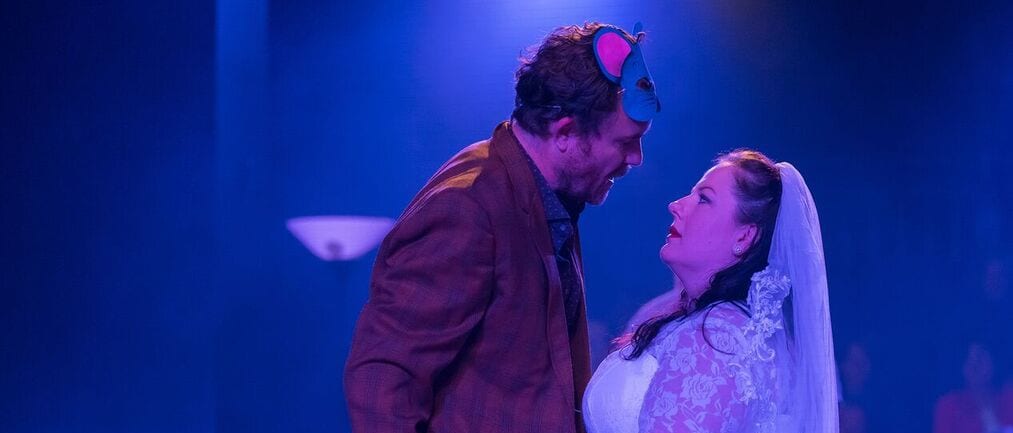The reaction to hearing about Bedlam’s new production—simultaneously performing Chekov’s Uncle Vanya and Shakespeare’s Romeo and Juliet with a cast of five—is bound to be “can they possibly pull this off?” Eliciting such skepticism seems to be Eric Tucker’s stock-in-trade: in 2014 he directed Bedlam in separate three-hour productions of Saint Joan and Hamlet with a cast of four. The answer to the question “can they possibly pull this off” for those productions was a resounding “yes,” especially for Saint Joan. Unfortunately, such a pleasant surprise does not await theatergoers at Uncle Romeo Vanya Juliet. There is a lot to admire in the ambition, and there are glimpses of how the production could have been successful, but it never coheres, and we are left with no greater insight into either masterpiece.
The opening dialogue is a snippet from Romeo and Juliet, before establishing the world of Vanya, which becomes the dominant setting upon which Romeo and Juliet intrudes in fits and bursts. “You stay in your dreams all day,” Sonya (Susannah Millonzi) chastises Vanya (Edmund Lewis) in Kimberly Pau’s colloquial, modern adaptation of Chekov. The scenes from Romeo and Juliet that manifest among the characters of Uncle Vanya seem to be those dreams of Vanya’s (at least in the first half). Amid his domestic discontent, middle-aged existential revulsion, and unrequited lust, a fantasy of himself as Romeo emerges. Early on Vanya is perplexed when the other characters launch into Shakespearean verse, but then he takes up the mantle of Romeo, but without getting much reaction from Juliet (Zuzanna Szadkowski, also Yelena) beyond scorn.
After the intermission, the Shakespearean focus shifts to Juliet: Szadkowski, now in a wedding dress, portrays Juliet as embittered not only about being forced to marry Paris but even at being forced by the play text into loving Romeo, at one point even exclaiming that she “can’t stand” him. I wasn’t sure if these were supposed to be moments of Yelena shining through Juliet or a commentary about Juliet’s lack of autonomy. Once Vanya has his mental break and fires his gun at the professor (Randolph Curtis Rand), Romeo and Juliet takes over for its longest stretch. It’s not always clear whose fantasy we’re in or what we’re supposed to make of the pathetic, embittered rendition of Shakespeare’s lovers, especially since the sequence in the second half races by in noise and confusion. Some ambiguity in the conceit could have been effective, allowing audience members to debate and discuss afterward, but as is, it just descends into incoherence.
Some of the Vanya scenes themselves are effective, particularly Susannah Millonzi’s Sonya. But with some uneven performances and the perplexing Romeo and Juliet interludes it never builds up the emotional power that is on display, for example, in Richard Nelson’s remarkable production currently playing at the Frederick Loewe Theatre at Hunter College. There are fleeting moments—Dr. Astrov breaking into Mercutio’s “Queen Mab” speech, or Sonja and Astrov shifting almost imperceptibly into the lark or nightingale debate from act 3 scene 5 of Romeo and Juliet—when we are tantalized with how this production could have worked, using Shakespeare’s play to accentuate the desperate emotions of the Vanya characters or to expose the contrast of their resignation to long, unhappy lives with the burst of energy and short-lived bliss of the young lovers. But instead, the conceit as executed here produces a perplexed “why?”

